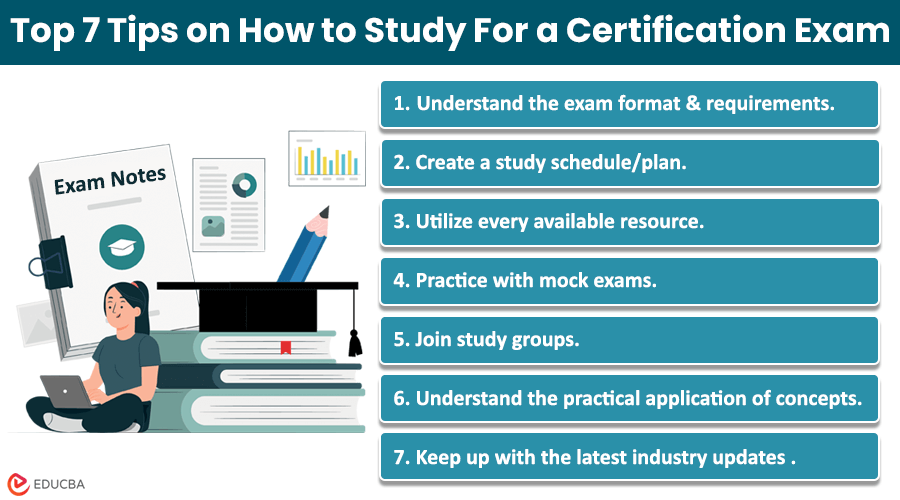
How to Study For a Certification Exam?
Professional certification is one of the major prerequisites for candidates looking for a career-specific job, such as an engineer, teacher, psychometrician, psychologist, or healthcare professional. This represents their proficiency in the field and their credibility as professionals.
If you are looking to apply for such positions, you must pass a certification or board exam in that field. It is necessary whether you are looking for office-based or work-from-home jobs. However, not everyone passes these exams. If you plan on taking a certification exam for your future job or dream career, this article will provide the best tips on how to study for a certification exam to improve your chances of success.
Tips For Passing an Exam
The following are some excellent tips on how to study for a certification exam, which will help you prepare effectively for your exams.
1. Understand the Exam Format and Requirements
Every certification examination has a unique structure and covers different subjects depending on the career you want to pursue. For instance, the Philippine Nurses Licensure Examination includes sections on professional nursing subjects like community nursing and maternal and child nursing.
Moreover, some sections of the exam might have more questions than others or carry heavy weightage in scoring, drastically affecting the overall score. Thus, knowing these details will allow you to tailor your study strategies more effectively and focus on major subjects, especially those where you feel less confident.
2. Create a Study Schedule/Plan
You will need an efficient and well-structured study plan to pass a certification exam. The plan should include the number of topics you need to cover and the time and resources you have. You can break down these into smaller and manageable tasks, i.e., taking each topic or subtopic daily. This method ensures you can master all the topics without resorting to the last minute.
You can also allocate specific weeks to focus on different sections and regularly review the topics for better retention. This tip is particularly helpful for retaining important information more effectively. Remember to include breaks and leisure activities in your schedule to prevent burnout. It will make studying for your certification exam more manageable.
3. Utilize Every Available Resource
Your certification exam combines all the knowledge you have learned from your degree program until now. So, don’t depend solely on study materials from review centers or your old notes; instead, try to use every available resource. It will deepen your understanding of complex subjects and help you prepare more thoroughly for your exams.
In the Philippines, review centers are particularly popular among test takers for their structured programs and expert guidance. Consider joining one of these with your study buddies or fellow test-takers. You can also study independently using online platforms such as Coursera, EDUCBA, Udemy, etc.
4. Practice with Mock Exams
Certification exams can be time-sensitive, meaning you must answer hundreds of questions in a limited time. For better preparation, you can practice with mock exams and time yourself according to the time limit for each section.
For example, if a section has 100 questions and a 2-hour time limit, follow this time frame in your mock exams. This approach will help you identify weak areas that need further review and improve your general test-taking skills.
Research has shown that students who regularly practice testing score higher on real exams because they improve their memory retention and test-taking skills. This strategy also effectively familiarizes candidates with a test’s format and question types, reducing anxiety on exam day.
5. Join Study Groups
While studying alone might seem like the most effective and practical approach, many test takers preparing for certification exams can benefit from joining study groups. These study groups create an encouraging environment for sharing knowledge and getting feedback on which sections need improvement.
You do not necessarily have to meet face-to-face to join a study group. You can sign up on online forums or join virtual groups on social media platforms where you can connect with peers or test takers who are preparing for the same exam as you. These groups offer accountability, valuable study tips, and moral support and also help you stay motivated throughout your preparation.
6. Understand the Practical Application of Concepts
When studying for the exam, memorizing information and data about that subject will not be enough. You should also know the practical application of your theoretical knowledge. It is because you will need to apply these concepts in real-life scenarios to solve complex problems, especially when you enter professional life.
Therefore, integrating theoretical knowledge with practical application is crucial for success in any career, as it enables you to navigate the challenges of your profession with greater efficiency.
7. Keep Up with the Latest Industry Updates
When preparing for an exam, staying updated on your field’s latest trends, guidelines, and practices is important. This continuous learning process will enhance your understanding and help you apply it to real-life situations. Utilizing resources like Microsoft AZ-400: Practice Tests Dumps can be an effective way to assess your knowledge and identify areas for improvement. It also guarantees you the latest knowledge and the most up-to-date methods or practices when entering the workforce. Moreover, you will also stay ahead of others in interviews.
Final Thoughts
Remember that discipline, dedication, and resilience are important for certification exams. You can set your career foundation and clear the exam with the right approach.
Though it may not seem like it now, every hour of study, every practice question, and every moment of doubt you overcome brings you one step closer to practicing the profession of your dreams. May your dedication and hard work be rewarded with more than a passing mark!
Recommended Articles
We hope this “How to Study For a Certification Exam” article was informative. To learn more, you can refer to the articles below.

